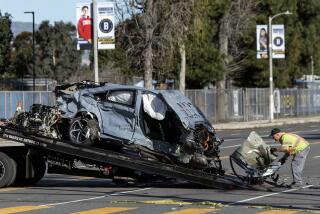Two firms plan to tap motorists’ cellphone signals for traffic checks
- Share via
ATLANTA — Tracking traffic can be an expensive business. In some places, costly cameras and radar systems are mounted high above highways to watch traffic at strategic points.
Transportation agencies also dig up roads to install sensors that monitor the flow. And helicopters roam the skies of the busiest cities, relaying information on the choked roadways to media outlets.
Atlanta’s horrendous traffic has inspired two companies that are looking to monitor many more roads and highways than is done today and at a much lower cost. Their approach: track the signals of cellphones that happen to be inside cars.
By using anonymous data from wireless providers to mark how fast cellphone handsets are moving -- and overlaying that information with location data and maps -- IntelliOne and AirSage hope to offer more detailed information and pragmatic advice than other firms that monitor traffic through radar, helicopters or cameras.
But some critics aren’t so sure the benefits outweigh the potential privacy risks.
Both systems rely on wireless providers allowing the companies to process the data from their towers that calculate the position of each phone about twice a second when it’s being used and once every 30 seconds when it’s not.
IntelliOne, in business since 1999, uses technology that can track vehicles to within 330 feet without using global positioning system satellites. Its software is designed to weed out pedestrians and crunch the data into detailed color-coded maps that show average speeds along roadways.
Light-traffic stretches are in green, slowdowns in yellow and logjams in red.
It rolled out a pilot program in Tampa, Fla., and plans to dive into its first market in March, in Ontario, Canada. Forty more markets could be covered by November 2007.
The service would be marketed free to wireless providers, who would share profit with IntelliOne. Media outlets could buy access to broad snapshots of a city’s traffic situation.
Individual customers would be able to buy a single use or pay a monthly fee for personalized information and a service that sends alternate routes when traffic takes a turn for the worse. No prices have been set yet.
AirSage has a similar strategy and has partnered with Sprint Nextel Corp. to offer government customers real-time traffic data, and already has four contracts with state transit departments.
More to Read
Inside the business of entertainment
The Wide Shot brings you news, analysis and insights on everything from streaming wars to production — and what it all means for the future.
You may occasionally receive promotional content from the Los Angeles Times.










